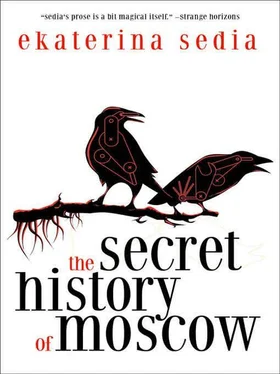Ekaterina Sedia
The Secret History of Moscow
She had long pale fingers, tapered like candles at the church. She swiped them through the flame of a match carefully at first, feeling nothing. Then she held them there longer, expecting them to drip and melt. Instead they turned red and blistered, and she withdrew carefully, watching the skin peel and stand in tiny transparent tents on her fingertips. She was already thinking of a lie to tell her coworkers to explain the blisters. Iron. Sizzling, spitting oil in the skillet. Napalm. She laughed at the thought. Napalm is never reassuring, and only reassuring things made for good lies-food, ironing, domesticity.
There was a knock on the bathroom door. “Galka, are you asleep in there?” Masha asked. “Come on, I have to go."
She blew out the match. “Will be right out."
"Are you smoking in there?"
"No,” she said, and opened the door.
Masha, pink and sweating, bustled past her, brushing her enormous pregnant belly against Galina, already hiking up her housecoat.
Galina exited hastily. Masha's pregnancy bothered her-not just because she was only eighteen and not because Masha's husband-to-be was still in the army, serving the last of his two draft years. The impending arrival of the squalling pink thing that would steal the remnants of her sister's affection away from her hurt more than she would dare to admit-their mother and grandmother were so excited about the baby. Galina pretended that she was, too, and burned herself with matches when nobody was watching as a punishment for being so selfish. She hoped she wouldn't get into trouble again.
She blew on her fingers and headed for the room she shared with her mother and grandmother; Masha now had a room of her own, all the more reason for resentment and consequent weeping at her own monstrosity. The grandmother was away, at the hospital again and perhaps not ever coming back home, and the mother was on the phone in the hallway. Galina relished the moments of solitude. She stretched on her bed and listened to the familiar noises of the railroad outside, and to the mumbling of her mother's voice in the hallway. Quite despite her intentions, she listened to her mother's words.
Of course she's too young , the mother said. But better too early than too late, and you know Galina: she's an old maid and I doubt there would be any grandchildren out of her, and really, I wish she would just have one out of wedlock, nowadays who really cares. I know she won't find a husband and I've resigned to that. But if she would just have a baby… Oh, I know, I told her a million times. But she's stubborn like you wouldn't believe, and I doubt any man would put up with that for long.
There was nothing there Galina hadn't heard before-to her mother, men were rare and precious prey that had to be snared with cunning and artifice. Galina couldn't remember when last their conversation hadn't turned into a lesson in making herself attractive-how she should dress nicer, and mouth off less and smile more. Maybe this way she would hold someone's attention long enough to get knocked up. Neither mentioned the premise of these speeches-that Galina was unlovable without artifice and deception. She tried to avoid talking to her mother lately. But the voice in the hallway continued:
I just don't want her to turn into a bitter man-hater, her mother said. Last time when she came home from the hospital (she could never bring herself to say ‘mental institution') I had hope for a while. But now-I don't know if she should just go back or if there's nothing they can do to fix her.
Galina remembered that day, when she had returned home, still swollen from the sulfazine-and-neuroleptics cocktails they had plied her with. The injection sites still hurt, and she resolved then to never do anything that would cause her to go back. She never told anyone about the things that flickered in the edges of her vision-strange creatures, awful sights. The mental institution was an extension of her mother, punishing her every time she disappointed. She chose her mother's dull torment over the acute pain of needles and the semiconscious nightmare of neuroleptics. She still felt guilty about her lies.
She pushed her face deeper into the pillow and pulled the pillow corners over her ears to block out the voice from the hallway. But it was too late-the fear had already kicked in, urging her to run, run far away, to protect herself. Like when she was a child (the only child), and there was a driving fear that the life she saw around her was all that awaited her in the future, and she wanted to run to avoid being trapped in the soul-killing routine of home and work, of TV, of acquiring things for the sake of it. How she longed to escape then; now, the desire was given a special urgency by her adult awareness that there wasn't anywhere to run to. The books she loved, the promises of secret worlds turned out to be lies.
And then there was a scream-she thought it was a cat at first, a neighbor's cat with a stepped-on tail complaining loudly of its bitter injury, and Galina wrapped the pillow tighter around her head. Then she realized that the cry was not feline at all but human. A baby.
She tossed the pillow aside and ran, her socks sliding on the smooth surface of hardwood floors. The cry was coming out of the bathroom, and Galina pounded on the locked door. No answer came.
Her mother, the phone abandoned dangling from the little table in the hallway, banged on the door too. A small woman, her fists struck the door with enough force to shake it. Galina stepped back.
"Don't just stand here,” her mother snapped.
Galina ran into the kitchen. There was an old chest of tools their father left before he departed for environs unknown, and she searched for it, slamming the cupboard doors, her panic growing with every little door opened and slammed shut in disappointment. She finally found the chest on top of the china cabinet, and grabbed the largest screwdriver there was. Armed, she rushed back to the bathroom door, where her mother was still banging and the baby still cried inside.
She pushed her mother out of the way and struck the door by the handle, chipping away long slivers of wood over the lock. When the lock was exposed, she pried it open.
The baby, umbilical cord still attached, lay on the floor. A squirming purple thing her mother rushed to pick up and rubbed with a towel. Galina's gaze cast about, between the white porcelain of the toilet and the chipped rim of the tub. Vanity. Mirror. Window. The window is open. But no Masha.
Her mother was too preoccupied with the baby to notice her youngest daughter's disappearance. Galina looked out of the window, as if expecting to see Masha hovering by some miracle eight stories above the ground. The air in front of her was empty, save for a lone jackdaw that circled and circled.
She stood on tiptoes, half-hanging out of the window to see the ground below her, afraid to see it. Through vertigo and the waves of nascent nausea she saw the asphalt below-empty, save for a couple of stray cats and a clump of old ladies on the bench by the entrance. The jackdaw cawed and flapped its wings. It circled over Galina's head, demanding attention; it landed on the windowsill and cocked its head, looking at Galina with a shiny black eye, its beak half-open as if it were trying to talk. Its dull feathers looked like iron.
Galina felt the world careen under her feet, and the incessant crying of the baby and her mother's plaintive voice fell away, the jackdaw's eye trapping her in a bubble of silence and awe. “Masha?” she whispered with cold lips. “Is that really you?"
The jackdaw hopped closer and nodded its head as if saying, yes it is me. It is me.
Читать дальше












